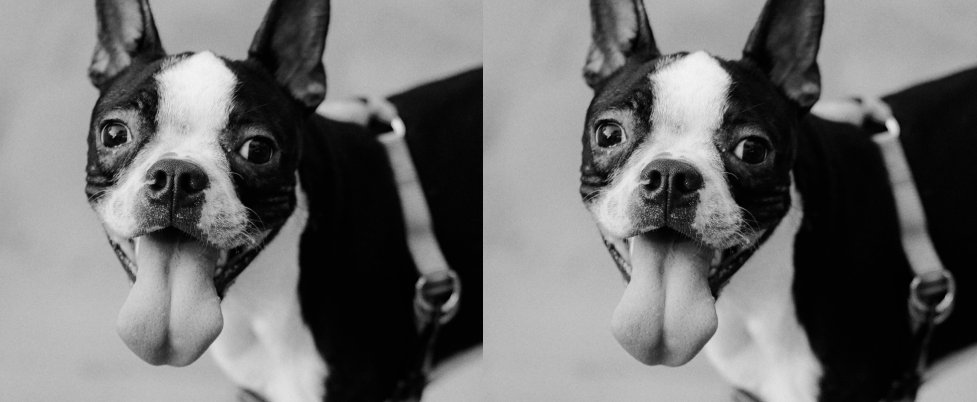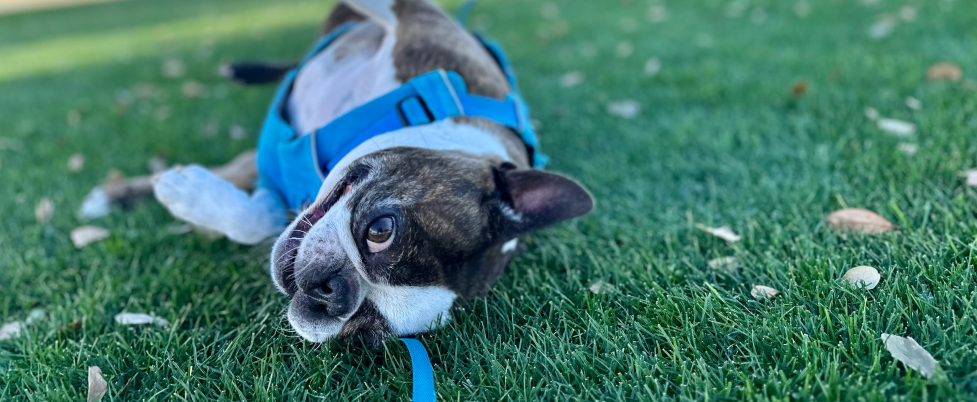From Puppyhood to Adulthood, Let’s Train and Play!

Disclaimer: I am not a veterinarian. Always consult a professional for guidance specific to your dog’s breed and needs.
Introduction
Boston Terriers are smart, energetic, and full of charm, but without proper training, their zest for life can turn into a challenge. A well-trained Boston is not only happier but also more confident and a delight to be around.
This guide will take you through the essentials of training and managing your Boston Terrier’s behavior. From setting a strong foundation in puppyhood to tackling common behavioral quirks and incorporating play into training, you’ll find everything you need to nurture a well-rounded, joyful companion. Let’s dive in!
1. Training Basics for Boston Terriers
Building a strong foundation in training is essential for a happy and well-behaved Boston. Here’s where to start:
Puppy Training: Start Off on the Right Paw
Training should begin as soon as you bring your Boston puppy home. Early lessons help them learn key commands like sit, stay, recall, and leash walking, setting the stage for good behavior throughout life. Consistency and patience are key—Boston Terriers are eager to please but can be a bit stubborn.
For a step-by-step guide, explore “Puppy Training for Boston Terriers: Your Step-by-Step Guide”.
Socialization: Building Confidence and Friendliness
Socialization is critical during the first few months of life. It helps your Boston feel comfortable around new people, pets, and environments, reducing fear-based behaviors later on.
Start small with positive introductions and gradually expand their exposure to different settings. Need more tips? Check out “Socializing Your Boston: From Nervous Pup to Social Butterfly”.
House Training: Setting the Foundation for Success
House training is a top priority for new Boston owners. Establish a consistent schedule for bathroom breaks, reward successes, and clean up accidents calmly to avoid confusion.
Troubleshooting accidents? Find solutions in “House training Your Boston: Quick & Easy Tips”.
2. Behavioral Help for Common Challenges
Boston Terriers have some unique quirks, but with a little know-how, you can tackle them head-on.
Separation Anxiety: Helping Your Boston Feel Secure
Boston Terriers are loyal companions, which makes them prone to separation anxiety. Look for signs like excessive barking, pacing, or destructive behavior when you leave.
Help your Boston feel more secure with gradual departures, calming routines, and interactive toys to keep them busy. Dive deeper into solutions with “Boston Terrier Separation Anxiety? Here’s How to Handle It”.
Managing Flatulence: Dealing With the “Boston Gas” Problem
Let’s face it—Boston Terriers can be a bit gassy. Their sensitive stomachs and fast eating habits often contribute to this issue.
Switching to high-quality, grain-free food and slowing down their mealtime can help minimize the problem. For more tips, visit “Managing Flatulence (Yikes!): Keep Your Boston’s Tummy Happy”.
Snoring: Understanding and Reducing It
Snoring might be endearing, but it can also signal health concerns in brachycephalic breeds like Boston Terriers. Ensure their sleeping area is free from allergens and consider using a supportive bed to improve airflow.
Learn more in “Why Your Boston Might Snore & How to Stop It”.
Troublesome habits and how to solve them!
Boston Terriers are lively, affectionate, and intelligent dogs, but like any breed, they can develop certain behavioral challenges. Excessive barking, destructive chewing, leash reactivity, and unwanted jumping are among the most common issues owners face. Understanding the root causes of these behaviors and applying effective solutions can help you build a stronger bond with your Boston Terrier and ensure a happier, well-behaved companion.
Learn more in “Troublesome habits and how to solve them!“
3. Fun & Games: Training Through Play
Training doesn’t have to feel like a chore. Make it fun for both you and your Boston by incorporating games and activities.
Mental Stimulation: Brainy Games for Bostons
Boston Terriers thrive on mental challenges. Puzzle toys, hide-and-seek games, and scent work are excellent ways to keep their sharp minds engaged.
For more ideas, visit “Mental Stimulation for Your Boston: Keeping Their Mind Sharp”.
Physical Activity: The Perfect Balance
Regular exercise is essential to keep your Boston healthy and happy. Short bursts of playtime, daily walks, and structured games like fetch or tug-of-war are great ways to burn energy.
Explore tailored routines in “Perfect Exercise Routines for Your Boston Terrier”.
Understanding Energy Needs
Every Boston has a unique energy level. While some need a bit more playtime, others are content with less. Pay attention to your dog’s cues to find the right balance of activity and rest.
Learn more in “Energy Levels: How Much Playtime Does Your Boston Need?”.
Tips for Lifelong Learning and Behavior Management
Training doesn’t end with puppyhood. Reinforce good behavior through adulthood by:
- Practicing commands regularly to keep them sharp.
- Addressing any behavioral changes as they arise.
- Keeping training sessions short, fun, and consistent.
Adapting your approach as your Boston ages will ensure they remain happy, confident, and well-behaved throughout their life.
Conclusion:
Training your Boston Terrier is about more than teaching commands—it’s about building a lasting bond and creating a harmonious life together. By addressing their unique behavioral needs, incorporating fun into training, and staying committed to their growth, you’ll raise a Boston that’s a true joy to live with.
Explore the linked articles for deeper insights, and remember: a well-trained Boston isn’t just happier—they’ll make your life happier too!

Additional Resources
For additional resources, refer to the Boston Terrier Club of America
Other articles by this author

“Hi! I’m Weezie, a spirited Boston Terrier / French Bulldog mix and self-proclaimed expert on everything Boston.